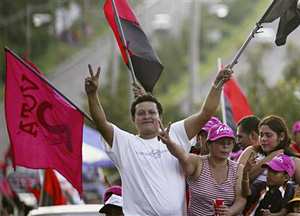 |
 |
 |
 News from Around the Americas | November 2006 News from Around the Americas | November 2006  
Daniel Ortega Returns to Power in Nicaragua
 Kieran Murray - Reuters Kieran Murray - Reuters


| | Sandinista supporters celebrate in Managua as their leader and presidential candidate, Daniel Ortega, appears to be headed to victory in Nicaragua's general elections, November 6, 2006. (Reuters/Oswaldo Rivas) |
Managua, Nicaragua - Nicaragua's former Marxist guerrilla leader Daniel Ortega bounced back to power on Tuesday in a presidential election victory that bolsters an increasingly assertive anti-U.S. bloc in Latin America.

Ortega had 38 percent support with votes tallied from more than 90 percent of polling stations at Sunday's vote, a lead of 9 points over his Washington-backed conservative rival Eduardo Montealegre.

Ortega, who fought U.S.-backed Contra rebels as president in the 1980s, was conciliatory in victory but the White House warned that its support for Nicaragua would hinge on the leftist's commitment to democracy.

The 60-year-old Sandinista met Montealegre late on Tuesday and both promised to work together to attack poverty and encourage the private investment need to create jobs.

"We thank God for this chance to build a Nicaragua in reconciliation by talking to each other and reaching consensus even with our differences," Ortega said, stressing he wants to keep Nicaragua open to investment.

Nicaragua, the poorest country in the Americas after Haiti, has never recovered from the civil war that killed 30,000 people and ruined the economy.

A series of pro-Washington governments that have ruled since Ortega was defeated at elections in 1990 have done little to alleviate poverty.

Ortega's victory in a third comeback attempt was a huge boost for Venezuelan President Hugo Chavez, who is trying to build a Latin American alliance of anti-U.S. leaders.

"Latin America is leaving forever its role as the backyard of the North American empire. Yankee go home! Gringo go home! This land is ours, this is our America!" said a delighted Chavez, whose closest allies are Cuban President Fidel Castro and Bolivian President Evo Morales.

Although sick since intestinal surgery in July, Castro sent effusive congratulations to his old comrade.

U.S. CAUTIOUS

The White House was cautious.

"We will work with their leaders based on their commitment to and actions in support of Nicaragua's democratic future," said Gordon Johndroe, spokesman for the White House National Security Council.

Venezuela backed Ortega's campaign by sending cheap fertilizer and fuel to Sandinista-led groups. It is now expected to help finance social programs in Nicaragua.

Some of Ortega's followers hope Chavez, rich with petrodollars, will help Nicaragua stand up to Washington.

"Whatever Chavez sends us helps us a lot and it makes us less scared because we know we are not alone, we have his support," said Miguel Mendoza, 45, who was orphaned at the age of 9 when his parents were killed by troops fighting against the Sandinista revolutionaries.

Ortega, who led a 1979 Sandinista revolution against dictator Anastasio Somoza, has dropped his Marxism of the Cold War era and now speaks mainly of God, peace and reconciliation.

He has backed a trade deal with the United States, but U.S. officials still do not trust him and worry about his friendship with Chavez.

Washington recently warned of a cut in investment and aid to Nicaragua if Ortega was returned to power, and some senior officials in President George W. Bush's administration have a long history of opposition to the president-elect.

They include Elliott Abrams, who serves on the National Security Council and was a key figure in the Iran-Contra affair in the 1980s, when the U.S. government secretly sold arms to Iran to channel funds to the Nicaraguan Contra rebels.

Ortega knows well the cost of confronting Washington. The Contra war and a U.S. economic embargo in the 1980s wrecked the Sandinistas' ambitious education and health programs.

Combined with his Marxist government's mismanagement and heavy-handed repression of dissent, the U.S. campaign finally put Ortega out of power when voters elected the first of three straight Washington-backed presidents in 1990.

Ortega was helped back to power by divisions in the right, which had in previous elections united behind a single candidate to keep him out.

Still, he is a divisive figure despised by many who blame him for the bloodshed and chaos of the 1980s. Even some of those who voted for him this time are wary.

"I hope I didn't make a mistake. I gave him my vote of faith. He has to govern and meet all his promises," said Cecilia Rivas, a 25-year-old student. | 
 | |
 |



